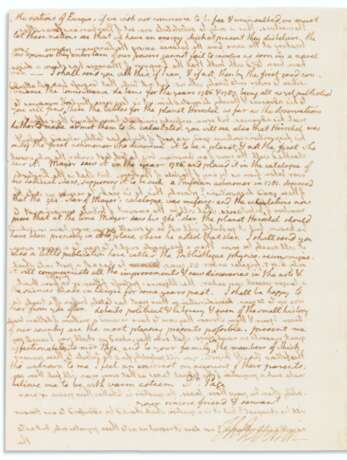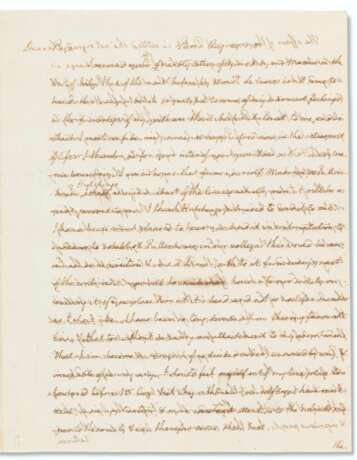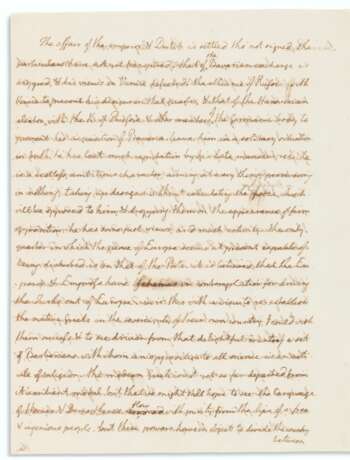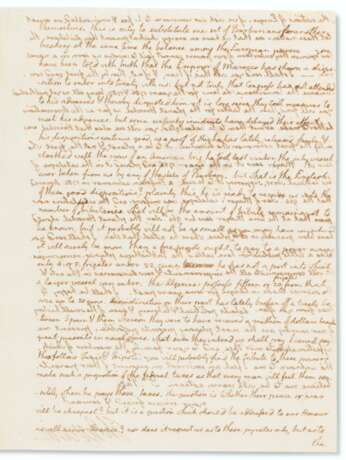ID 411454
Lot 47 | On the Mason Dixon Line & the Barbary Pirates
Estimate value
$ 20 000 – 30 000
Four pages, 230 x 183mm, bifolium. Housed in a custom clamshell case.
Thomas Jefferson writes on the Mason Dixon Line, Greek independence, and the bedeviling issue of the Barbary Pirates: "The question is whether their peace or war will be cheapest?" Jefferson opens his letter thanking Page for his "notes of your operations on the Pennsylvania boundary. I am in hopes that from yourself, Madison, Rittenhouse, or Hutchings I shall receive a chart of the line as actually run. It will be a great present to me." David Rittenhouse, who had worked on the early surveys of Mason and Dixon in the 1760s, had recently helped complete the boundary survey to the southwestern corner of Pennsylvania in 1784. Jefferson also expresses his pleasure that Page had been asking Rittenhouse to lead the American Philosophical Society. "This would be an immense acquisition and would draw youth to it from every part of the continent. You will do much more honour to our society on reviving it, if you place him at its head and not so useless a member as I should be. I have been so long diverted from this my favourite line, and that too without acquiring an attachment to my adopted one, that I am become a mongrel, of no decided order, unowned by any, and incapable of serving any." Rittenhouse would eventually serve in that capacity from 1791 to his death in 1796.
Jefferson then turns to news from Europe, describing the complex foreign policy machinations of Joseph II, the Holy Roman Emperor, including his plans to "drive the Turks out of Europe," and adding that "Were this with a view to re-establish the native Greeks in the sovereignty of their own country, I could wish them success and to see driven from that delightful country a set of Barbarians with whom an opposition to all science is an article of religion." But the pragmatist in him conceded that the Emperor had no such designs, but rather schemed "to divide the country between themselves," exchanging "one set of Barbarians for another."
The Greek question leads him to the subject of diplomacy with Barbary states in North Africa, who had been harassing European and American ships in the Mediterranean: "You have been told with truth that the Emperor of Morocco has shewn a disposition to enter into a treaty with us," but Congress had failed to attend "to his advances and thereby disgusted him." Despite this, the emperor was still receptive to a treaty. "As a proof of this, he has lately released freely and cloathed well the crew of an American brig he took last winter; the only vessel ever taken from us by any of the state of Barbary." But the amount of tribute was in question, and Jefferson feared that it would "surely be more than a free people ought to pay to a power owning only 4 or 5 frigates under 22 guns." As to Algeria, a stronger naval power on the North African coast, they had recently broken off talks with Spain over a treaty that was to include a tribute of a "million of dollars besides great presents in naval stores." As to the "sum they intend we shall pay I cannot say." Tunis and Tripoli presented similar problems, but to a lesser degree. To the entire issue, Jefferson poses a question that would would again ask during his presidency: "The question is whether their peace or war will be cheapest?" And just as importantly, it brought up the question of American credibility and honor before an international community that thought little of the infant American republic: "If we wish our commerce to be free and uninsulted, we must let these nations see that we have an energy which at present they disbelieve. The low opinion they entertain of our powers cannot fail to involve us soon in a naval war."
| Address of auction |
CHRISTIE'S 8 King Street, St. James's SW1Y 6QT London United Kingdom | |
|---|---|---|
| Preview |
| |
| Phone | +44 (0)20 7839 9060 | |
| Buyer Premium | see on Website | |
| Conditions of purchase | Conditions of purchase |






